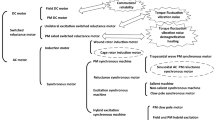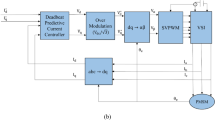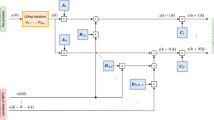Abstract
This paper proposes an offset-free speed control method for induction motors using a model predictive control and disturbance observer. The proposed method has cascade control loops i.e. inner-loop model predictive torque control and outer-loop robust speed control. The outer-loop robust speed controller is composed of a stabilizing MPC and a discrete-time disturbance observer. The disturbance observer estimates the effects of the parameter uncertainties and the load torque to yield an offset free speed tracking, while taking the torque limit of the motor into account. This speed controller generates the reference torque for the inner-loop torque controller. A loss-minimizing continuous control set model predictive torque controller(CCS-MPTC) considering the current and voltage constraints of the motor is used as the inner-loop torque controller. Experimental results show a significant performance improvement when the torque constraints are considered in the DOB design.
Similar content being viewed by others
References
S.-K. Sul, Control of Electric Machine Drive Systems, John Wiley & Sons, 2011.
K. H. Nam, AC Motor Control and Electrical Vehicle Applications, CRC press, 2010.
T. Geyer, G. Papafotiou, and M. Morari, “Model predictive direct torque control-part I: Concept, algorithm, and analysis,” IEEE Transactions on Industrial Electronics, vol. 56, no. 6, pp. 1894–1905, Jun. 2009.
G. Papafotiou, J. Kley, K. G. Papadopoulos, P. Bohren, and M. Morari, “Model predictive direct torque control-part II: Implementation and experimental evaluation,” IEEE Transactions on Industrial Electronics, vol. 56, no. 6, pp. 1906–1915, Jun. 2009.
S. A. Davari, D. A. Khaburi, and R. Kennel, “An improved FCS-MPC algorithm for an induction motor with an imposed optimized weighting factor,” IEEE Transactions on Power Electronics, vol. 27, no. 3, pp. 1540–1551, 2012.
D. Xu, X. Song, B. Jiang, W. Yang, and W. Yan, “Data-driven sliding mode control for mimo systems and its application on linear induction motors,” International Journal of Control Automation and Systems, vol. 17, no. 7, pp. 1717–1725, 2019.
C. Bordons and C. Montero, “Basic principles of MPC for power converters: Bridging the gap between theory and practice,” IEEE Industrial Electronics Magazine, vol. 9, no. 3, pp. 31–43, Sep. 2015.
A. A. Ahmed, B. K. Koh, and Y. I. Lee, “A comparison of finite control set and continuous control set model predictive control schemes for speed control of induction motors,” IEEE Transactions on Industrial Informatics, vol. PP, no. 99, pp. 1–1, 2017.
S.-K. Kim, D.-K. Choi, K.-B. Lee, and Y. I. Lee, “Offset-free model predictive control for the power control of three-phase AC/DC converters,” IEEE Transactions on Industrial Electronics, vol. 62, no. 11, pp. 7114–7126, 2015.
G. Feng, Y.-F. Liu, and L. Huang, “A new robust algorithm to improve the dynamic performance on the speed control of induction motor drive,” IEEE Transactions on Power Electronics, vol. 19, no. 6, pp. 1614–1627, Nov. 2004.
S. Li and Z. Liu, “Adaptive speed control for permanent-magnet synchronous motor system with variations of load inertia,” IEEE Transactions on Industrial Electronics, vol. 56, no. 8, pp. 3050–3059, 2009.
X. Li and S. Li, “Speed control for a pmsm servo system using model reference adaptive control and an extended state observer,” Journal of Power Electronics, vol. 14, no. 3, pp. 549–563, 2014.
S. K. Kim, H. S. Park, J. H. Han, and Y. I. Lee, “Stabilizing model predictive control for torque control of permanent magnet synchronous motor,” Proc. of the 33rd Chinese Control Conference, pp. 7772–7777, Jul. 2014.
J. Wang, F. Wang, Z. Zhang, S. Li, and J. Rodriguez, “Design and implementation of disturbance compensation-based enhanced robust finite control set predictive torque control for induction motor systems,” IEEE Transactions on Industrial Informatics, vol. 13, no. 5, pp. 2645–2656, 2017.
M. Iwasaki and N. Matusi, “Robust speed control of IM with torque feedforward control,” IEEE Transactions on Industrial Electronics, vol. 40, no. 6, pp. 553–560, 1993.
K. Hong and K. Nam, “A load torque compensation scheme under the speed measurement delay,” IEEE Transactions on Industrial Electronics, vol. 45, no. 2, pp. 283–290, Apr. 1998.
T. Umeno and Y. Hori, “Robust speed control of DC servomotors using modern two degrees-of-freedom controller design,” IEEE Transactions on Industrial Electronics, vol. 38, no. 5, pp. 363–368, Oct. 1991.
L. Wang, J. Su, and G. Xiang, “Robust motion control system design with scheduled disturbance observer,” IEEE Transactions on Industrial Electronics, vol. 63, no. 10, pp. 6519–6529, Oct. 2016.
G. Xia, C. Sun, B. Zaho, and J. Xue, “Cooperative control of multiple dynamic positioning vessels with input saturation based on finite-time disturbance observer,” International Journal of Control Automation and Systems, vol. 17, no. 2, pp. 370–379, 2019.
Y. S. Lee, D. S. Kim, and S.-K. Kim, “Disturbance observer-based proportional-type position tracking controller for DC motor,” International Journal of Control Automation and Systems, vol. 16, no. 5, pp. 2169–2176, 2018.
J. Back and H. Shim, “Adding robustness to nominal output-feedback controllers for uncertain nonlinear systems: A nonlinear version of disturbance observer,” Automatica, vol. 44, no. 10, pp. 2528–2537, 2008.
H. Shim and N. H. Jo, “An almost necessary and sufficient condition for robust stability of closed-loop systems with disturbance observer,” Automatica, vol. 45, no. 1, pp. 296–299, 2009.
H. K. Khalil, Nonlinear Systems, 3rd ed., Prentice-Hall, Upper Saddle River, NJ, 2002.
C. Lee, Y. Joo, and H. Shim, “Analysis of discrete-time disturbance observer and a new q-filter design using delay function,” Proc. of 12th International Conference on Control, Automation and Systems (ICCAS), pp. 556–561, IEEE, 2012.
A. Ahmed, B. K. Koh, J.-S. Kim, and Y.-I. Lee, “Finite control set-model predictive speed control for induction motors with optimal duration,” IFAC-PapersOnLine, vol. 50, no. 1, pp. 7801–7806, 2017.
T. Satoh, T. Omori, N. Saito, J.-y. Nagase, and N. Saga, “Model predictive control for mechatronics: A disturbance observer approach,” Proc. of 42nd Annual Conference of the IEEE Industrial Electronics Society, IECON 2016, pp. 209–214, IEEE, 2016.
S. Lim and K. Nam, “Loss-minimising control scheme for induction motors,” IEE Proceedings-Electric Power Applications, vol. 151, no. 4, pp. 385–397, 2004.
A. A. Ahmed, B. K. Koh, H. S. Park, K.-B. Lee, and Y. I. Lee, “Finite-control set model predictive control method for torque control of induction motors using a state tracking cost index,” IEEE Transactions on Industrial Electronics, vol. 64, no. 3, pp. 1916–1928, 2017.
S.-K. Kim, J.-S. Kim, C. R. Park, and Y. I. Lee, “Output-feedback model predictive controller for voltage regulation of a DC/DC converter,” IET Control Theory & Applications, vol. 7, no. 16, pp. 1959–1968, 2013.
J. S. Lim, C. Park, J. Han, and Y. I. Lee, “Robust tracking control of a three-phase DC-AC inverter for UPS applications,” IEEE Transactions on Industrial Electronics, vol. 61, no. 8, pp. 4142–4151, 2014.
H.-B. Shin and J.-G. Park, “Anti-windup PID controller with integral state predictor for variable-speed motor drives,” IEEE Transactions on Industrial Electronics, vol. 59, no. 3, pp. 1509–1516, 2012.
Author information
Authors and Affiliations
Corresponding author
Additional information
Publisher’s Note Springer Nature remains neutral with regard to jurisdictional claims in published maps and institutional affiliations.
Recommended by Associate Editor Jong Min Lee under the direction of Editor-in-Chief Keum-Shik Hong. This work was supported by the grant from Seoul National University of Science and Technology (2019-0628).
Kooksun Lee received his B.S. and M.S. degrees in Electronics and Communications Engineering and Control and Instrumentation Engineering from Kwangwoon University, Seoul, Korea, in 2009 and 2011, respectively. He received his Ph.D. degree in Control and Instrumentation Engineering from Kwangwoon University. From 2016 to 2017, he was a postdoctoral researcher at Kwangwoon University and Seoul National University of Science and Technology, Seoul, Korea. Since 2018, he has been at Alienrobot Inc., Korea, where he is currently a chief technology officer. His research interests include nonlinear, robust control for electronic devices, alternative energy systems, and robotics.
Jeongju Lee was born in Korea in 1991. He received his B.S. and M.S. degrees in electrical and information engineering from Seoul National University of Science and Technology, Seoul, Korea, in 2016 and 2018, respectively. His research interests include electric machine drives and control engineering.
Young IL Lee received his B.S., M.S., and Ph.D. degrees in Control and Instrumentation Engineering from Seoul National University (SNU), in 1986, 1988, and 1994, respectively. He was visiting research fellow of Dept. of Engineering Science, Oxford University during 1998.2~1999.7 and 2007.2~2007.7. He worked in Gyeongsang National University from 1994 to 2001 and moved to Seoul National University of Science and Technology (SeoulTech) in 2001. He is currently a Professor of the Department of Electrical and Information Engineering of SeoulTech. He is a senior member of IEEE since 2015 and is serving as an editor of International Journal of Control, Automation and Systems (IJCAS) and International Journal of Automotive Technology (IJAT) from 2017 to 2019, respectively. Currently he is the director of electrical vehicle society of Korea Institute of Electrical Engineering (KIEE) and the head of research center of electrical and information technology of SeoulTech. His area of scientific interest includes MPC for systems with input constraints and model uncertainties, MPC method for DC-DC, AC-DC converter and DC-AC inverter, control of EV chargers, control of AC motors for EV application and energy management algorithm of micro-grids.
Rights and permissions
About this article
Cite this article
Lee, K., Lee, J. & Lee, Y.I.L. Robust Model Predictive Speed Control of Induction Motors Using a Constrained Disturbance Observer. Int. J. Control Autom. Syst. 18, 1539–1549 (2020). https://doi.org/10.1007/s12555-019-0215-1
Received:
Revised:
Accepted:
Published:
Issue Date:
DOI: https://doi.org/10.1007/s12555-019-0215-1




